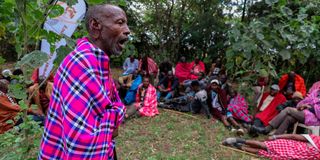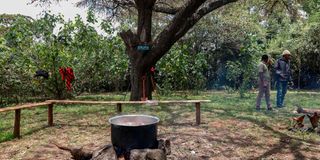Traditional 'Olpul' meetings become battleground for girls' rights in Narok

Lemondol ole Memuruti, an elder, addresses other elders and youth on the effects female genital mutilation and gender-based violence at Olpul in Narok County on September 25, 2024.
What you need to know:
Maasai elders and warriors unite in sacred gatherings to end FGM, promote girls' education, and empower women through cultural transformation.
Community-driven efforts, legal frameworks, and grassroots initiatives are reducing harmful practices, fostering gender equality, and transforming traditions in Narok.
The biting cold pierce through our bodies on this chilly morning as we make our way into a heavily forested compound.
The cloudy weather has offered a recipe for the cold mid-morning breeze that makes us shiver. We are tens of kilometres from the busy Narok- Mai-Mahiu highway, deep in the heart of Ntulele in Narok North where a special elders meeting is about to start.
Our journey began half an hour ago and it is a 30-kilometre drive from Narok town. The smooth Narok-Mai-Mahiu road has offered a glimpse of vast tracts of land, a beautiful scenery that appeals to the eye. Herds of cattle and goats graze in the fields and in other hundreds of acres, maize is being harvested.
The favourable weather this year seems to have come in handy for the maize farmers, blessing them with bumper harvests.
Inside this forested compound – the home of one of the village elders – is a house at the far left. In this man-made forest, tens of indigenous trees form a canopy. Birds jump from one tree to the other as they sing melodic tunes. It is such a sweet experience to the ears.
About 100 metres from the entrance at the far right, a group of men stand under a huge tree. They are elders and moran (members of the Maasai warrior group). A white goat is lying on the ground and an elderly man is wielding a knife, ready to take its life. In a flash of a second, the knife pierces through the goat’s neck.
The animal groans in pain as blood splashes into a sufuria. The place where the slaughtering is taking place is called Olpul, a site inside a forested area that is considered sacred among the Maasai. This is where elders meet to discuss important issues touching on the community. Whenever they meet, a goat is slaughtered and its meat roasted.

Olpul where Narok elders and moran meet, eat goat meat and discuss matters affecting their community, on September 25, 2024.
They eat the meat and drink its soup as they discuss. Women are not allowed near the place. If a woman comes, the men will not eat the meat, the community's culture dictates.
Today, a meeting is to be held at Olpul. It is an extraordinary gathering meant to address harmful cultural practices.
In the past, issues touching on pasture, trade, culture and cohesion dominated Olpul meetings. However, in recent times, there is a twist to the benefit of the girls and women in the community.
The elders, accompanied by the moran, are here to talk about how to eradicate female genital mutilation (FGM), child marriage and the need to increases girls’ education.
And as the aroma of the roasting goat fills the sacred place, one cannot help but notice the outer layer developing an irresistible crust. The meat looks yummy and is mouthwatering. A brief prayer is said in the Maasai language to kick-start the meeting.
After a brief introduction, Musa Sayo, 75, stands up, supported by his walking stick. He tells the gathering the community has no option but to do away with harmful practices. The men nod in agreement.
“As elders, we are no longer abetting things like FGM and child marriage. We are, in fact, now working with the chiefs and other government agencies to have those abetting such vices arrested and taken to court. FGM has slowly been forgotten and we now have uncut girls getting married without a problem,” Musa says.
He adds that the community must encourage girls’ education if it wants to develop like the other communities. “Girls’ education has come to change the community. Our women are now engaging in business and farming, which was unheard of before. As men, we are now involving women in decision-making at home.”
Musa ole Punyua notes that FGM and child marriage have no benefit and only discriminate against girls and women. Mr Punyua, a polygamist with two wives, says the two vices only make girls quit school, thus ruining their future.
“As a community, FGM has not assisted us in any way. We are now telling our young men why it is not wrong to marry a girl who has not been cut. We want our girls to be educated so that they can become competitive in the job market, just like girls from other communities,” he says.
He, however, reveals that the Prohibition of Female Genital Mutilation Act, 2011, has played a leading role in making elders abandon the practice. The law is bearing fruit. It carries a minimum punishment of three-year imprisonment and a Sh200,000 fine.
Pastor Luka Yeye is also part of the gathering and weighs in on the debate. He observes that as a church, they have joined the war on harmful practices to safeguard girls.
Frank Parkipale, a moran fighting FGM, notes that even though FGM and child marriage have greatly reduced, they are still being done secretively in some places. He underscores the impact of Olpul in denouncing such retrogressive cultural practices.
“As moran, we have accepted to support the fight against these vices. We can no longer accept the cutting of our girls, which then lead to child marriage. We now act as spies and report to the chiefs those abetting the crime. Our sisters and daughters need to be safe and complete,” Parkipale tells the meeting.
Lemasi Menja, another moran and anti-FGM champion from Suswa, says awareness needs to be enhanced to achieve zero FGM prevalence in the county.
“The community has had strong beliefs on FGM and child marriage that need concerted efforts to break. There is a need for robust awareness to rope in more community members in this fight. We also need to empower men so that they can understand what gender discrimination means and why it’s wrong,” Lemasi says.
He proposes that the elders and the moran jointly carry out robust public campaigns in schools, churches and baraza to spread the gospel against FGM and child marriage. The meeting unanimously agrees on the importance of fighting these two vices.
The attendants agree to continue being champions against these vices and ambassadors of gender equality. Such meetings are paying off as FGM prevalence has dropped from 78 per cent in 2014 to 51 per cent in 2022, according to the Kenya Demographic and Health Survey.
To accelerate the efforts, Narok County is a beneficiary of an initiative being spearheaded by UNFPA and the Centre for Rights, Education, and Empowerment (Creaw). It focuses on economic empowerment to address gender inequality, which is a key driver of FGM.
Mr William Mbanyamlenge, a project officer at Creaw, says actions by elders to denounce FGM and child marriage is a major step in eradicating harmful practices.
“Elders are the custodians of culture, they hold a lot of influence and their move through Olpul to support the fight against FGM and child marriage is commendable as it can only mean that girls and women in the community will be safe,” Mr Mbanyamlenge says.
He adds that the initiative has raised awareness of the harmful practices. “Over the past year, tremendous strides have been made, with more women and girls in Narok County becoming empowered and informed of their rights. The project’s impact is evident, with beneficiaries gaining access to essential services such as healthcare, legal aid, and psychosocial support to address issues related to gender-based violence (GBV) and FGM.”
UNFPA Country director Anders Thomsen tells the Nation, “Women engaged in these programmes develop a new sense of confidence and are now acting as agents of change to ensure most of the girls at risk are protected from FGM. They work closely with the local administration and rescue centres on FGM prevention and response.”
Dr Thomsen, however, adds that the journey has not been a bed of roses as deep-rooted social-cultural norms that perpetuate FGM have sometimes proved difficult to unravel.
“The deeply rooted social-cultural norms require sustained engagement with communities to realise transformation. This is why UNFPA supports local and grassroots organisations implementing long-term community-led interventions to eliminate the vice.”
He says the enforcement of laws that prohibit FGM remains a challenge, hence the programme engages duty bearers to enhance case management and strengthen justice system to ensure survivors of FGM and child marriage access justice.
Dr Thomsen reveals that effective law enforcement has enhanced prevention of and response to FGM. UNFPA is also implementing similar initiatives in Baringo, Garissa, West Pokot, Samburu, Bungoma, Isiolo and Elgeyo Marakwet counties.
And as the meeting concludes, we sit down according to age groups and enjoy the meat, which has been roasted in strict adherence to the Maasai culture. It is soft and delicious.
To crown it all, soup, mixed with traditional herbs, is served. After all is done, we return to Narok town for the night.



